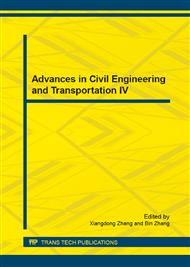p.1120
p.1124
p.1128
p.1133
p.1137
p.1142
p.1146
p.1151
p.1157
Study on Non-Equilibrium Evaluation Model of Water Resources Development and Utilization
Abstract:
According to the area of water resources development and utilization of non-equilibrium phenomena, introduces the concept of water resource Gini coefficient, introduces two kinds of calculation methods of water resources in the Gini coefficient, establishes a non-equilibrium evaluation model of water resources, from the two aspects of intragenerational and intergenerational were evaluated for non-equilibrium degree and the law of development and evolvement of water resources development and utilization in the area, and to put forward the idea of water resources and social economy unbalanced development model. Through an empirical analysis of water resources Gini coefficient in Hubei province, obtained the practical achievement and conclusion.
Info:
Periodical:
Pages:
1137-1141
Citation:
Online since:
March 2015
Authors:
Keywords:
Price:
Сopyright:
© 2015 Trans Tech Publications Ltd. All Rights Reserved
Share:
Citation:


